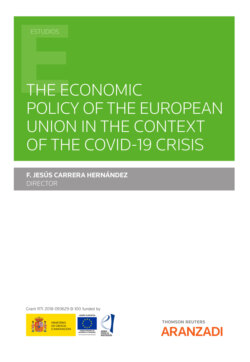Читать книгу The economic policy of the european union in the context of the covid-19 crisis - Francisco Jesús Carrera Hernández - Страница 12
На сайте Литреса книга снята с продажи.
7. THE INTRODUCTION OF CONDITIONALITY LINKED TO THE RESPECT OF THE RULE OF LAW
ОглавлениеThe difficulties in reaching an agreement on the new instrument have been clear since the presentation of the proposal for the recovery instrument by the European Commission, or even earlier.
From the point of view of the Member States, the President of the European Council tried to alleviate the prevailing divergence of perspectives on several occasions during the month of July 2020. First, with a compromise proposal launched on the 10th and summarized in the terms convergence, resilience and transformation (“repairing the damage caused by Covid-19, reforming our economies, remodelling our societies”). Second, on the occasion of the Summit held between July 17 and 21. In the end, an agreement was reached, thanks to the staggered reduction of the initial claims, in the terms specified in the Conclusions of the European Council of the same month.
The agreement between the Member States was reached while avoiding an important aspect: the introduction of conditionality linked to the respect of the rule of law when applying the new recovery instrument and receiving financial assistance from the EU. This is an element of debate that had been emphasized, especially in view of the problems generated by Poland and Hungary in recent years, and also taking into account that Poland happens to be the third State most benefited by the instrument of recovery.
From this point of view, the July 2020 European Council decided to defer such a linkage and to revert to the matter without delay (p. 16). Instead, the European Council Conclusions included a very generic formula: “The financial interests of the Union shall be protected in accordance with the general principles enshrined in the Treaties of the Union, in particular the values of article 2 of the TEU. The European Council underlines the importance of protecting the financial interests of the Union. The European Council stresses the importance of respecting the rule of law”. Consequently “a conditionality regime will be established to protect the budget and Next Generation EU. In this context, the Commission will propose, in the event of non-compliance, measures to be adopted by the Council by qualified majority”.
During the autumn of 2020, the regulatory procedure was developed, culminating with the approval of Regulation 2020/2092 on a conditionality regime for the protection of the Union budget, being applicable from January 1, 202157. In relation to the new legal regime introduced, it is necessary to highlight three issues.
On the one hand, beyond the debate held on its content in relation to the approval of Next Generation, it should be noted that there were already previous proposals dating back to 201858. Additionally, as J. V. Louis has pointed out, the idea of introducing conditionality linked to respect for the values of the Union and the rule of law was first expressed in 2013, and a similar conditionality has been put into practice in the horizontal regulation on the structural funds59.
Second, it is a legal regime that has led to an institutional conflict, especially between the Commission and the European Parliament. Due to the presentation, in March 2021, of an action for annulment against this Regulation before the Court of Justice by Poland and Hungary, the European Commission has de facto ceased to apply this rule pending the ruling of the Court of Justice, which is unlikely to arrive before the end of 2021. The European Parliament has been very forceful on this point, threatening the European Commission with an action for failure to act before the Court of Justice, including a motion of censure against it. At the same time, the European Commission is drawing up guidelines on the application of the aforementioned Regulation that have also led the European Parliament to point out that “the application of the Regulation… cannot be subject to the adoption of guidelines, and that no guideline will undermine the intention of the co-legislators60”.
Lastly, the approved Regulation is not exclusively linked to the implementation of Next Generation, although its context has allowed the new legal regime to be approved more quickly. The approval of measures against a Member State can occur, in general, when the conduct of the State, which consists of a violation of the principles of the rule of law, seriously affects (or threatens to affect) the sound financial management of the Union budget or the protection of its financial interests in a sufficiently direct way (art. 4)61. This will allow the adoption of any of the measures provided for in art. 5 of the Regulation (measures for the protection of the Union budget62) following the procedure foreseen in art. 6.
